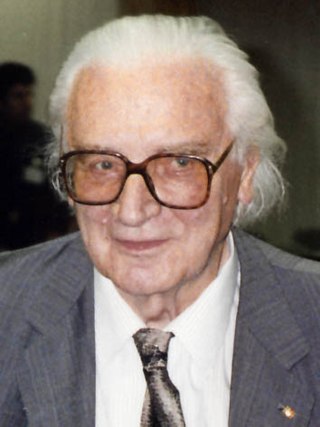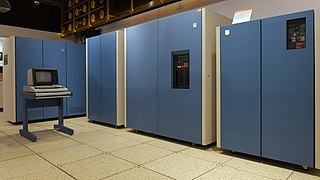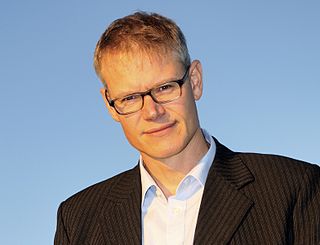Related Research Articles

In computing and electronic systems, binary-coded decimal (BCD) is a class of binary encodings of decimal numbers where each digit is represented by a fixed number of bits, usually four or eight. Sometimes, special bit patterns are used for a sign or other indications.

Konrad Ernst Otto Zuse was a German civil engineer, pioneering computer scientist, inventor and businessman. His greatest achievement was the world's first programmable computer; the functional program-controlled Turing-complete Z3 became operational in May 1941. Thanks to this machine and its predecessors, Zuse is regarded by some as the inventor and father of the modern computer.
Pascal is an imperative and procedural programming language, designed by Niklaus Wirth as a small, efficient language intended to encourage good programming practices using structured programming and data structuring. It is named after French mathematician, philosopher and physicist Blaise Pascal.

Gerhard Karl Erich Gentzen was a German mathematician and logician. He made major contributions to the foundations of mathematics, proof theory, especially on natural deduction and sequent calculus. He died of starvation in a Czech prison camp in Prague in 1945, having been interned as a German national after the Second World War.
Plankalkül is a programming language designed for engineering purposes by Konrad Zuse between 1942 and 1945. It was the first high-level programming language to be designed for a computer.

The IBM 4300 series are mid-range systems compatible with System/370 that were sold from 1979 through 1992. They featured modest electrical and cooling requirements, and thus did not require a data center environment. They had a disruptive effect on the market, allowing customers to provide internal IBM computing services at a cost point lower than commercial time-sharing services. All 4300 processors used a 3278-2A, 3279-C or 3205 display console rather than a 3210 or 3215 keyboard/printer console.

Peter Weibel was an Austrian post-conceptual artist, curator, and new media theoretician. He started out in 1964 as a visual poet, then later moved from the page to the screen within the sense of post-structuralist methodology. His work includes virtual reality and other digital art forms. From 1999 he was the director of the ZKM Center for Art and Media Karlsruhe.
zbMATHOpen, formerly Zentralblatt MATH, is a major reviewing service providing reviews and abstracts for articles in pure and applied mathematics, produced by the Berlin office of FIZ Karlsruhe – Leibniz Institute for Information Infrastructure GmbH. Editors are the European Mathematical Society, FIZ Karlsruhe, and the Heidelberg Academy of Sciences. zbMATH is distributed by Springer Science+Business Media. It uses the Mathematics Subject Classification codes for organising reviews by topic.

Philosophy of Arithmetic: Psychological and Logical Investigations is an 1891 book about the philosophy of mathematics by the philosopher Edmund Husserl. Husserl's first published book, it is a synthesis of his studies in mathematics, under Karl Weierstrass, with his studies in philosophy and psychology, under Franz Brentano, to whom it is dedicated, and Carl Stumpf.
Periphere Computer Systeme (PCS) was founded in Munich by the brothers Georg and Eberhard Färber in 1969. In the 1980s and 1990s it was a manufacturer of a line of UNIX-based workstations called "Cadmus". Their flavor of System V was called MUNIX; it was the first port of System V performed in Germany. They also developed a networking protocol that was based on the Newcastle Connection and dubbed MUNIX/net, at the time competing with Sun Microsystems' NFS.

Albrecht Beutelspacher is a German mathematician and founder of the Mathematikum. He is a professor emeritus at the University of Giessen, where he held the chair for geometry and discrete mathematics from 1988 to 2018.
Willard L. Miranker was an American mathematician and computer scientist, known for his contributions to applied mathematics and numerical mathematics.
Heinrich August Rothe (1773–1842) was a German mathematician, a professor of mathematics at Erlangen. He was a student of Carl Hindenburg and a member of Hindenburg's school of combinatorics.

Caroline Y. Robertson-von Trotha is a Scottish sociologist and cultural scientist, working in Germany.
Unums are a family of number formats and arithmetic for implementing real numbers on a computer, proposed by John L. Gustafson in 2015. They are designed as an alternative to the ubiquitous IEEE 754 floating-point standard. The latest version is known as posits.
Ulrich W. Kulisch is a German mathematician specializing in numerical analysis, including the computer implementation of interval arithmetic.
Validated numerics, or rigorous computation, verified computation, reliable computation, numerical verification is numerics including mathematically strict error evaluation, and it is one field of numerical analysis. For computation, interval arithmetic is used, and all results are represented by intervals. Validated numerics were used by Warwick Tucker in order to solve the 14th of Smale's problems, and today it is recognized as a powerful tool for the study of dynamical systems.

Alwin Oswald Walther was a German mathematician, engineer and professor. He is one of the pioneers of mechanical computing technology in Germany.

Helmut Schwichtenberg is a German mathematical logician.

Carsten Könneker is a German science journalist and science communication researcher. From 2010 to 2019, he was editor-in-chief of Spektrum der Wissenschaft, the German edition of Scientific American. From 2012 to 2018, he was professor of science communication and science studies at Karlsruhe Institute of Technology, and founding director of the German National Institute for Science Communication, Karlsruhe. From 2019 to 2022, he was one of the managing directors of the Klaus Tschira Foundation.
References
- ↑ McDermid, John A. (1993) [1991]. "Chapter 8.5.2". Software Engineer's Reference Book (revised ed.). Butterworth-Heinemann Ltd. / Elsevier. p. 187. ISBN 0-7506-0813-7. ISBN 1483105083 / ISBN 9781483105086 . Retrieved 2016-05-30.
- ↑ CW (1985-12-20). "Rechner liefern keine korrekten Ergebnisse - Neue Arithmetik der Karlsruher Forschungsgruppe Kulisch in der 4361 realisiert" [Computers don't deliver exact results - Karlsruhe research team Kulisch implements new computer arithmetic for the IBM 4361]. Computerwoche (in German). Karlsruhe, Germany: IDG Business Media GmbH. Archived from the original on 2016-05-30. Retrieved 2016-05-30.
- ↑ Lortz, Bruno (1971). Eine Langzahlarithmetik mit optimaler einseitiger Rundung[A large-number arithmetic with optimal one-side rounding] (Ph.D. thesis) (in German). Universität Karlsruhe.
- ↑ Kulisch, Ulrich W. (1976). Grundlagen des Numerischen Rechnens. Mathematische Begründung der Rechnerarithmetik (in German). Mannheim, Germany: Bibliographisches Institut. ISBN 3-411-01517-9. ISBN 978-3-411-01517-7.